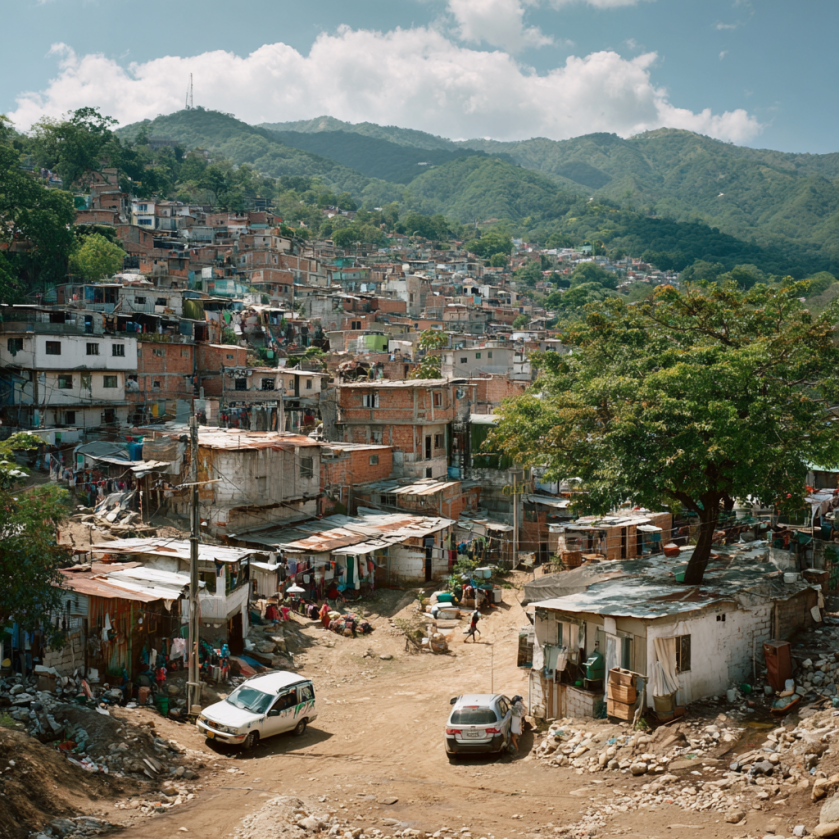By Mike Savage, Co-founder, Savage-Rivera Foundation
Honduras faces one of the highest poverty rates in Latin America, with approximately 48% of its population living below the national poverty line.
As co-founder of the Savage-Rivera Foundation, an organization dedicated to providing essential supplies and household goods to impoverished families across Honduras, I have witnessed firsthand how poverty manifests differently across the country’s diverse geographical landscape.
The stark contrast between rural and urban poverty in Honduras reveals not just different symptoms of the same disease, but fundamentally different challenges that require tailored approaches to create meaningful change.
The Rural Reality: Isolation and Agricultural Dependence
Rural poverty in Honduras is characterized by profound isolation and overwhelming dependence on subsistence agriculture. In the mountainous regions and remote valleys where our foundation operates, families often live hours away from the nearest town, connected only by dirt roads that become impassable during the rainy season.
This geographical isolation creates a cascade of challenges that perpetuate cycles of poverty across generations.
Infrastructure Deficits in Rural Areas
The infrastructure gaps in rural Honduras are staggering. Only 19% of rural households have access to improved sanitation facilities, compared to 86% in urban areas. Clean water access remains sporadic, with many rural communities relying on contaminated wells or distant water sources that require hours-long journeys to reach. Our foundation has delivered water purification tablets and basic filtration systems to remote villages where waterborne illness is endemic, but these temporary solutions highlight the need for systematic infrastructure investment.
Electricity reaches only 70% of rural households, and even where power lines exist, service is unreliable. This energy poverty affects everything from food preservation to children’s ability to study after dark.
Road infrastructure is equally problematic, with many rural communities accessible only by footpath or unpaved roads that wash out regularly during Honduras’ intense rainy seasons.
Employment and Economic Opportunities
Rural employment in Honduras revolves almost exclusively around small-scale agriculture and livestock. Most rural families survive on subsistence farming, growing basic grains like corn and beans on tiny plots of land.
Coffee cultivation provides some cash income for families in suitable highland areas, but volatile international commodity prices make this income unpredictable.
The average rural family in Honduras earns less than $2 per day, with limited opportunities for economic diversification. Young people face a stark choice: remain in rural areas with minimal prospects or migrate to cities or abroad in search of better opportunities.
This migration pattern drains rural communities of their most productive citizens, leaving behind aging populations with even fewer resources.
Service Access Challenges
Healthcare access in rural Honduras presents many challenges. Many rural communities have no health clinic within a reasonable distance, forcing families to travel for hours to receive basic medical care. When they do reach a clinic, shortages of medicines and medical supplies are common. Our foundation has partnered with rural clinics to provide basic medical supplies, but the need far exceeds available resources.
Educational opportunities are similarly constrained. While primary schools exist in most rural communities, secondary education often requires students to travel to larger towns or board away from home – an impossible expense for most rural families. Teacher shortages plague rural schools, and educational materials are often outdated or nonexistent.
Yet, we understand the important role of quality education in overcoming family poverty in Honduras.
Urban Poverty: Density and Marginalization
Urban poverty in Honduras presents a different set of challenges, concentrated in the sprawling marginal neighborhoods that surround cities like Tegucigalpa and San Pedro Sula.
These areas, known locally as “colonias,” house families who have migrated from rural areas seeking better opportunities but often find themselves trapped in cycles of urban poverty.
Infrastructure in Urban Slums
While urban areas generally have better infrastructure than rural regions, the marginal neighborhoods where most urban poor live often lack basic services.
Informal settlements built on hillsides or flood-prone areas frequently lack proper water, sanitation, and electrical connections. Many families tap illegally into municipal services, creating safety hazards and unreliable access.
Housing in these areas is typically constructed incrementally from whatever materials families can afford – concrete blocks, corrugated metal, and wood scraps.
Overcrowding is severe, with extended families often sharing single-room structures. The density of these settlements creates unique challenges around waste management and disease transmission that don’t exist in rural areas.
Employment Dynamics
Urban employment opportunities are more diverse than in rural areas but remain limited for those without education or skills. Many urban poor work in the informal economy – street vending, domestic work, construction day labor, or small-scale manufacturing.
While these activities can provide slightly higher incomes than rural subsistence farming, they offer no job security, benefits, or legal protections.
The maquiladora (assembly plant) industry provides formal employment opportunities, but these jobs are often poorly paid and offer limited advancement prospects. Gang activity in many urban poor neighborhoods creates additional barriers to employment, as employers may be reluctant to hire from certain areas, and workers may face extortion or recruitment pressures.
Service Access in Cities
Urban areas offer significantly better access to healthcare and education than rural regions, but quality and affordability remain major barriers for the urban poor. Public hospitals and clinics exist but are often overcrowded and under-resourced. Private healthcare is available but unaffordable for most poor families.
Educational opportunities are more abundant in cities, with both public and private schools available. However, the cost of uniforms, supplies, and transportation can be prohibitive for poor families. Additionally, the pressure for children to contribute to family income through work often forces them to leave school early.
Violence and Security: A Cross-Cutting Challenge
Both rural and urban poor communities in Honduras face significant security challenges, though they manifest differently.
Urban areas struggle with organized gang violence, extortion, and territorial disputes that make daily life dangerous for residents of marginal neighborhoods.
Rural areas, while generally less affected by organized crime, face different security challenges including land disputes, cattle rustling, and domestic violence exacerbated by isolation and limited law enforcement presence.
The impact of violence extends beyond immediate safety concerns. Businesses are reluctant to invest in high-crime areas, limiting economic opportunities. Families often keep children home from school due to safety concerns, perpetuating cycles of limited education and poverty.
Strategies for Addressing Rural Poverty
Effective rural poverty alleviation in Honduras requires strategies that address the fundamental challenges of isolation and agricultural dependence while building on rural communities’ existing strengths and social structures.
Infrastructure Investment
Rural road construction and maintenance must be prioritized to connect isolated communities to markets and services. This includes not just vehicle-accessible roads but also footpaths and bridges that communities use daily.
Water and sanitation infrastructure should focus on community-managed systems that can be maintained locally rather than complex centralized systems.
Expanding electricity access through both grid extension and off-grid renewable energy solutions can transform rural livelihoods.
Solar power systems, in particular, can provide reliable electricity for lighting, communication, and small-scale productive activities.
Agricultural Development
Moving beyond subsistence agriculture requires supporting crop diversification, introducing improved farming techniques, and developing value chains that connect rural producers to urban and international markets.
This includes providing access to quality seeds, fertilizers, and technical assistance while developing storage and processing facilities that allow farmers to add value to their products.
Climate-resilient agriculture is particularly important given Honduras’ vulnerability to extreme weather events. Supporting drought-resistant crops and sustainable farming practices can help rural families maintain food security in changing conditions.
Education and Health Services
Mobile service delivery models can bring healthcare and educational opportunities to remote rural areas more cost-effectively than establishing permanent facilities in every community. This includes mobile medical clinics, distance learning programs, and traveling teacher programs that can serve multiple communities.
Investing in rural teacher training and providing incentives for qualified teachers to work in rural areas is essential for improving educational quality. Similarly, training community health workers can provide basic healthcare services and health education at the local level.
Strategies for Addressing Urban Poverty
Urban poverty interventions must focus on improving conditions within existing informal settlements while creating pathways for economic advancement and social mobility.
Slum Upgrading
Rather than relocating informal settlements, slum upgrading programs can improve living conditions by providing basic infrastructure, secure land tenure, and improved housing.
This approach recognizes that informal settlements serve important economic functions and house people who need to remain close to urban employment opportunities.
Community-based approaches to slum upgrading, where residents participate in planning and implementation, tend to be more successful and sustainable than top-down programs.
Economic Opportunities
Supporting microenterprise development and informal sector improvements can create economic opportunities for urban poor populations. This includes providing access to credit, business training, and market access while working to formalize successful informal businesses.
Skills training programs aligned with urban labor market demands can help urban poor residents access better-paying formal sector employment. This is particularly important for young people who need alternatives to gang involvement.
Violence Prevention
Community-based violence prevention programs that provide alternatives to gang involvement, particularly for young people, are essential for breaking cycles of urban poverty. This includes sports programs, job training, and conflict mediation services.
Improving police-community relations and strengthening local justice systems can help create safer environments that support economic development and social investment.
Cross-Cutting Strategies
Several strategies can address poverty challenges that exist in both rural and urban contexts while recognizing the specific manifestations in each setting.
Social Protection Programs
Conditional cash transfer programs can provide immediate poverty relief while incentivizing investments in health and education. Honduras’ existing programs should be expanded and strengthened to reach more poor families while ensuring that conditions are appropriate for both rural and urban contexts.
Migration and Remittances
Rather than viewing rural-urban migration as a problem to be solved, policies should focus on making migration work better for both sending and receiving communities. This includes supporting circular migration patterns that allow families to maintain rural connections while accessing urban opportunities.
Similarly, policies should maximize the development impact of international remittances by reducing transfer costs and supporting productive investments in both rural and urban areas.
Governance and Participation
Strengthening local governance and creating meaningful opportunities for community participation in development planning is essential for ensuring that interventions address real needs and build local capacity. This is particularly important in Honduras, where weak governance has contributed to persistent poverty.
Conclusion: A Holistic Approach to Poverty Reduction
Through our work with the Savage-Rivera Foundation, we have learned that addressing poverty in Honduras requires understanding and responding to the distinct challenges faced by rural and urban poor communities while recognizing their interconnections. Rural poverty cannot be addressed without considering urban dynamics, as rural-urban migration continues to reshape both contexts.
Successful poverty reduction strategies must be comprehensive, addressing not just income poverty but also the multidimensional aspects of poverty including education, health, infrastructure, and security.
They must also be adaptive, recognizing that poverty is not a static condition but changes in response to economic, environmental, and social factors.
Most importantly, poverty reduction efforts must center the voices and experiences of poor communities themselves.
The families we serve through our foundation are not passive recipients of aid but active agents working to improve their circumstances within significant structural constraints.
Supporting their efforts requires understanding their strategies, respecting their priorities, and working alongside them to address the systemic barriers that perpetuate poverty.
The challenge of poverty in Honduras is complex and multifaceted, but it is not insurmountable. With sustained commitment, adequate resources, and approaches that recognize both the commonalities and differences between rural and urban poverty, significant progress is possible.
The question is not whether Honduras can reduce poverty, but whether the country and the international community will make the sustained investments necessary to make this vision a reality.
We are hoping that they can.
ABOUT SAVAGE
Mike Savage of New Canaan, CT is the Founder of 1-800Accountant that helps businesses with their accounting services and needs through cutting-edge technology and customer support. He runs the company alongside CEO Brendon Pack.
In his spare time, Savage enjoys creating unique koi ponds, collecting Michael Jordan sneakers, vintage Lego sets, and admiring muscle cars.




